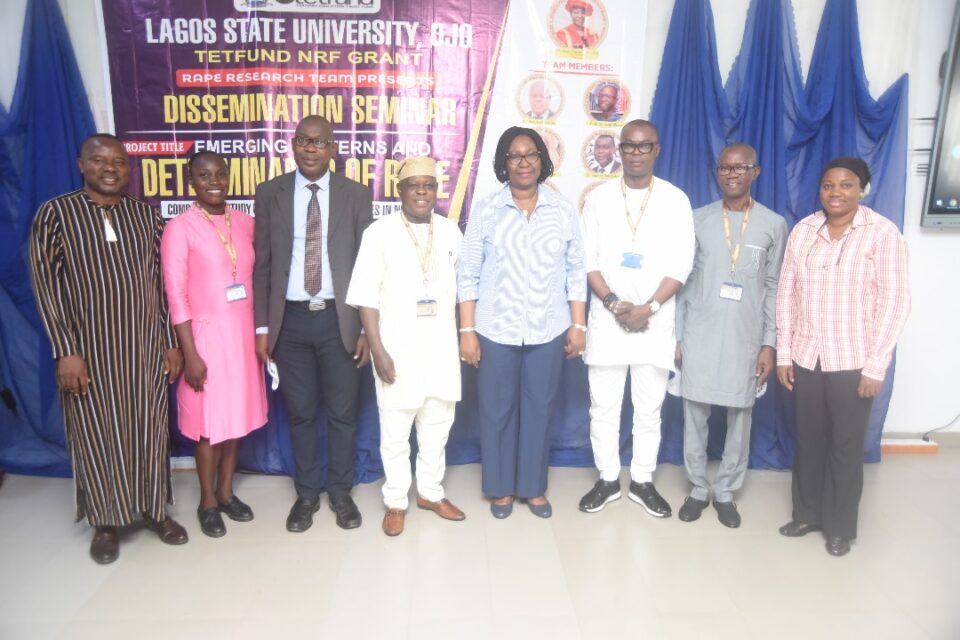Cyriacus Nnaji
The Lagos State University Tertiary Education Trust Fund (TETFund) National Research Fund Grant Rape Research Team has concluded its study and presented the findings to the public.
The 8-man team, which had as its principal investigator, the Deputy Vice-Chancellor, Academic and Professor of Economics, Prof. Olufunsho Omobitan, presented its key findings at the first-of-its-kind dissemination seminar held on Wednesday, 6th November 2024 at the ACEITSE Lecture Hall, main campus, Ojo, in the presence of members of the university management, staff and students, and the media.
Detailing the journey of the project titled “Emerging Patterns and Determinants of Rape: Comparative Study of Rural-Urban Communities in Nigeria” team coordinator, Prof. Onipede Wusu recalled how the project formally kicked off in April 2021 with funding from TETFund and concluded earlier this year, producing some interesting findings.
He explained that the team used a mixed-method approach to generate and analyse quantitative and qualitative data on emerging patterns and determinants of rape among females in rural and in urban communities in 12 Nigerian states, with findings suggesting that rape incidence is generally higher in rural than in urban communities in Nigeria.
More interestingly, outcomes of the research also suggest that family members and neighbours are the principal perpetrators of rape while listing childhood sexual abuse experience, ethnicity, childhood family situation and background as critical risk factors of various forms of rape.
The research findings, which were later presented by each of the eight members of the team, established that there are evidences of childhood sexual abuse, rape among young females, women of reproductive age, elderly females and marital rape in rural and urban communities.
It concluded that to constrain the incidence of rape in Nigeria, effective child protection law, sustained campaigns against sexual violence and harmful lifestyles as well as family sanctity are imperative.
The Vice-Chancellor, Prof. Ibiyemi Olatunji-Bello, in her address, described the study as “an unprecedented, most comprehensive, and most profoundly empirical study on rape in Nigeria”, urging all relevant stakeholders to give the outcome all the seriousness it deserves.
She said, “Rape, you will all agree with me, is a global social and public health problem. In virtually all cultures, violent sexual engagement and defilement of all categories of females is a disturbing reality. Hence, this study’s outcomes and recommendations must be taken seriously by all stakeholders in Nigeria, including government agencies, lawmakers, advocacy groups, community leaders, school administrators, teachers, parents, guardians, religious leaders, individuals and the public.” She further urged everyone in position to safeguard female children as well as adult and aged women who are the major victims of rape in rural and urban communities.
The Vice Chancellor further stated, “I am particularly glad to witness the completion of the Tertiary Education Trust Fund (TETFund) National Research Fund (NRF) study, which grant for this study was awarded in 2021 to the Rape Research Team made up of eight (8) faculty members in Social Sciences and Education in Lagos State University (LASU), Ojo, Lagos, Nigeria. I am thrilled that during my tenure as the 9th substantive Vice-Chancellor of this prestigious University, this TETFund NRF grant in the tune of N34 million was won.”
The Principal Investigator of the Research team, Prof. Olufunsho Omobitan while interacting with the media said “The Rape Research National Dissemination Seminar was to present to the public key findings from the research we have been doing for the past 20 months, to let the public know what we have done. In our proposal for the research we made it clear that we are going to hold a dissemination seminar and that is what we just did.”
Speaking on the choice of rape as a topic of research Prof. Omobitan said “It is a contemporary issue, not only in Nigeria, it is a global issue. The girl child needs to be protected; the female youth also needs to be protected from sexual harassment, from rape, even women generally, husbands harassing their wives, so it is a contemporary issue.”
Speaking also, the man at the centre of the research, the arrowhead of the entire research activity, Prof Onipede Wusu, Professor of Sociology and Demography, LASU and creator of the group said that in the process of their investigation they found out that between 34 to 36 per cent of their sample reported that they have been abused during their childhood. Wusu maintained that there is need to work on child protection. “We need to protect our children. In terms of adult rape from our study, we observed factors like ethnic group people belong to, it is strange to say that even in the Hausa/Fulani Ethnic group, it appears rape is low, but there is no reason we would argue because of childhood marriage, where people marry from, say, age of nine or ten and now you are talking about rape, they are already married. And this marital rights are one of the factors that are giving problem, as soon as a woman is married, she becomes a sex object to the husband any time the husband wants her, she shouldn’t deny the husband, and she is raped, but they would not see it as rape and that is why in the Northern part of the country the report is relatively low.
“But in the southern part where there is more enlightenment, where the issue of childhood marriage has been handled to a large extent, you can see the percentage is higher,” he stated.
On what Government should do with the finding, he said, “There is need to come out with quick policies like child protection, that child protection is critical, there is need to give support to married women to be able to speak up, it is when they speak up that they would be able to get support.” He added that from the sample gathered, about 20 per cent of married women complained of abuse nationally, which is not a small percentage in that sample, so it means that something should be done.”
A high point of the programme was the unveiling of the project policy brief by the Vice-Chancellor for the benefit of the university, the state, and nation at large.
Goodwill messages were delivered by Dean, Faculty of Social Sciences, Prof. Olufemi Lawal and Dean, Faculty of Education, Prof. Gabriel Akindoju, who was represented by Prof. Jimoh Akiola.
Members of the research team who were drawn from five departments from two faculties include Prof. Olufunsho Omobitan, Prof. Onipede Wusu, Prof. Folashade Airat, Dr Ibrahim Rotimi Aliu, Dr Adijat Olateju, Dr Alausa Waheed, Dr Busoye Olupooye, and Dr Sakiru Raji.



